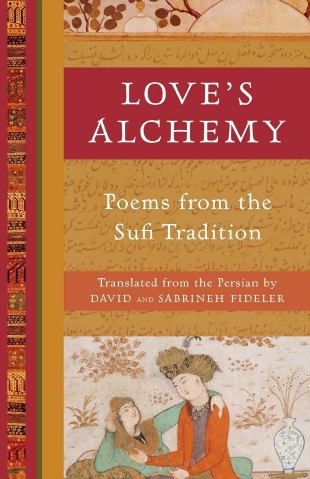David Fideler has taught on the college level, written widely on the spiritual traditions of the Western world, and teaches courses on Sufi poetry. Sabrineh Fideler holds a degree in English-Persian translation from Azad University in Iran and has worked as a freelance translator. They currently live in western Michigan. In this collection of 150 poems, they share mystical expressions by Sufi poets in the spirit of Rumi, who remains the most popular poet in America.
Reading this treasure trove of poems translated from the Persian, we come to a fresh appreciation for the themes and images common in Rumi that are also used by others. In discussing the language of Persian mystical poetry, the Fidelers point out that taverns and drunkenness refer to divine love and the intoxication that comes with surrender to the Beloved.
Many of the poets on these pages celebrate divine nearness and intimacy. There is great yearning in these poems for union with the Friend. For the Sufis, the highest form of knowledge is love, and we are challenged to move beyond the precincts of the tiny ego and be transformed by divine light. In the appendix, the Fidelers talk about the challenges of translating Persian poetry. They also include a glossary.
Here's a sampler of spiritual poems from the Sufi tradition. In "Your Irresistible Glance," 'Ayn al-Qudat Hamadani writes:
"With your irresistible glance,
you captured my heart and soul.
Having robbed me of those,
take away my name and accomplishments too.
If any trace of me remains in this world,
please, don't delay — take that too."
Many poems on these pages are about the radiance of divine grace and how it shows up everywhere. In "Every Face Turns Toward You," Tabib Shirazi writes:
"You show your face
in every particle.
You've become
the shining sun
from every direction.
Present in Ka'ba and present in monastery,
every face
turns toward your own —
You are the destination
of believers
and nonbelievers
alike."
In "Service," Sa'di makes a point that Sufis nod in agreement with:
"Worship is nothing aside
from serving others.
It is not dependent
on prayer rugs, rosaries,
or the Sufi's cloak."
Finally, "One Body," another poem by Sa'di, is about unity:
"All human beings
are the members
of one body —
every person is a glint,
shining from a single gem.
When the world causes pain for one member,
how could the other members
ever rest in peace?
If you lack grief
for another one's sorrow,
why call yourself
a human being?"
What a different world it would be if we would put this empathy into practice in our daily lives.
